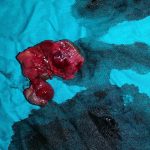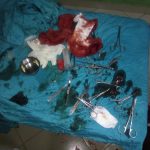I am going to narrate the personal experience I had with a patient who later had hemorrhoid surgery.
I am a medical doctor and a corp member serving in one of the private hospitals in Benin city Nigeria and I must say it has been a wonderful experience.
I was the doctor on duty that day when this patient male 36 years was brought into our clinic by his brothers. The said patient was barely able to walk and appears to be in severe pains coupled with some form of distress. He was practically crying and begging for help and relieve from his pains.
Immediately i jumped into action, told his relatives to take him to the emergency room and took a quick history from him and his relatives. He said he had been having recurrent anal protrusion for the past 15 years now. He said this anal protrusion started small, was initially able to push it back in and was bearably painful. However, since 2016, the swelling has increased, difficult to push back in and bleeds profusely when he defaecates. He told me that passing stool has become a dreadful event because of the severe pains and profuse bleeding. In the same 2016, he was counselled for hemorrhoidectomy by a surgeon but he declined because of fear of the complications and general anaesthesia.
He does not carry heavy loads or lifts weight, he does not have peptic ulcer disease, not diabetic or hypertensive, does not smoke or takes alcohol.
I did abdominal examination and ended up with digital rectal examination (anal examination). It was classical, the anus was protruded, bleeding and packed with cotton wool. The cotton wool was soaked with blood. I had to apply lidocaine spray or gel to be able to touch the swelling(because of his pains). The swelling was not reduceable (could not be pushed back) into the anus and was ulcerated. The swelling was in the 3, 7 and 11 O’clock position (you may not understand this term)
I instructed my ever ready nurses to give him injection diclofenac and Pentazocine to relieve his pains and calm him down. He was also started on some antibiotics.
I made a diagnosis of 3rd degree external and internal hemorrhoids and I counselled him for emergency hemorrhoidectomy. He expressed his fears for general anaesthesia and I re-assured him that we will do a spinal anaesthesia for him during the surgery. With this, he will be able to see, hear and even talk to the surgeons during the surgery. He agreed and signed the consent form (medical document containing terms of agreement between the doctor and the patient). The patient was also counselled on the possible complications of hemorrhoidectomy.
Now is the cost of surgery. Calmer now, we negotiated the price of the hemorrhoid surgery with the patient and the relatives. We both agreed he will pay #170,000 for the surgery including drugs, blood transfusion(if need arises), tests and hospital stay ( we estimated he would spend 5 days to 1week in the hospital for proper recovery).
Some blood tests was done. We grouped and cross-matched 2 pints of blood, checked his packed cell volume (PCV, which was 35%), performed a renal function test, blood sugar test, urinalysis, bowel preparation and an abdominal ultrasound scan.
Patient was worked up, primed and prepared for the surgery by the nurses
Thereafter, I put a call through to my Medical Director and the general surgeon to tell them about the patient and they came in almost immediately for the surgery. The general surgeon came in with the anaesthetist and the patient was wheeled to the to the theatre.
In the theatre, patient was re-assessed and re-interviewed by the general surgeon(I am his junior and still learning under him) in order to pick what I missed. Second evaluation and opinion is recommended in medical practice. Thereafter, the anaesthetist passed his spinal anaesthesia and surgery was commenced in earnest after placing the patient in lithotomy position. I was part of the surgical team.
The troublesome anal veins causing the hemorrhoids was removed in stages by the surgeon. He ensured the patient lost minimal amount of blood. He ligated (tied up) some of the bleeding veins. After the surgery, he packed the anus with gauze impregnated with antibiotics (sufra tulle) a to prevent infection and further stop bleeding.
The patient discussed with us throughout out the surgery and also told us to help him take pictures for his personal consumption.
We finished the surgery within 45 minutes to 1 hour and patient was there after cleaned up and rolled to the recovery room.
The immediate post up condition of the patient was satisfactory. He was told not not eat for 2 days and placed on dextrose infusion . He was on strict bed rest with adequate painkillers and strong antibiotics. On the third day post surgery, the gauze in the anus was removed and he was commenced on sitz bath (to help relieve his pain, clean up the anus and reduce inflammation and swelling), pap, ‘agidi’, and other light foods to encourage bowel movement. In the evening of that same day he started eating his normal heavy food to open up the anus.
We continue him on antibiotics and on the 4th day, he moved bowels. Passing stool was initially painful but later subsided.
The common complications of hemorrhoid surgery are bleeding, post-operative pain, wound infection and breakdown (hemorrhoidectomy is a dirty surgery), urinary retention because of the anal pain, and the long term complication of anal stenosis.
Luckily for this patient, apart from his constant pain which was taken care of by adequate analgesia, there were no other complications. He lost minimal amount of blood and there was no need for him to be transfused.
He was discharged on the 6th day and you need to see the smile on his face. I told him to continue with his sitz bath twice daily for 2 weeks.

Credit: Nimedhealth





















